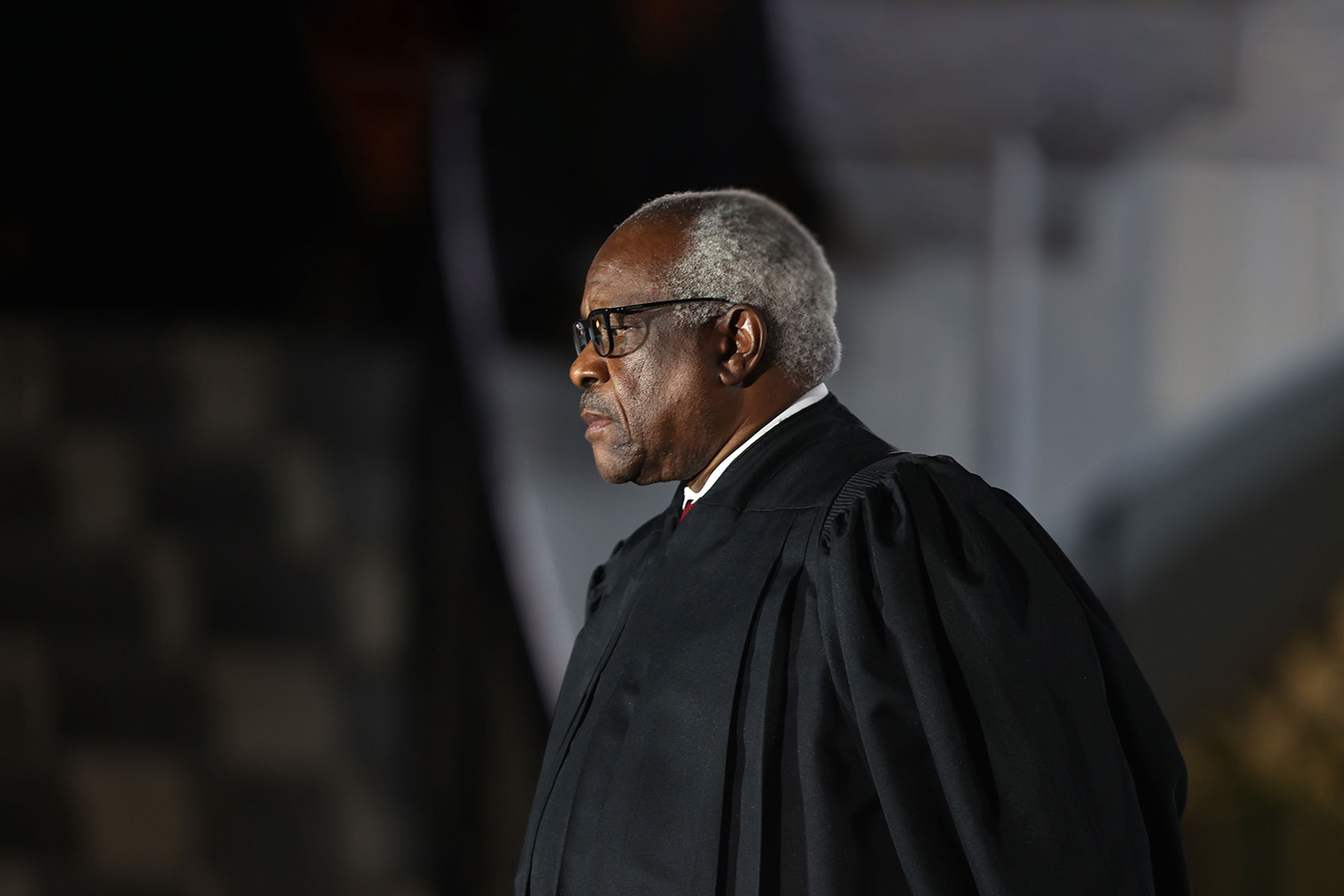The Associated Press just released an in-depth study on how access to the Supreme Court has been bought over the years. On one end, deep-pocket donors are invited to public speaking engagements with ideologically aligned justices, but the collection plate is tastefully hidden until after the fact. On the other end, public events morph into exclusive junkets with prolonged, personal access extended over days. No justice has benefitted from the symbiosis — or the luxury — more than Clarence Thomas.
Gifts lavished on Thomas and his crusading wife Ginni taste, feel, and smell uber lux: island hopping on staffed superyachts; pampered vacations worth millions over two decades; bougie boarding school tuition; a free refurbished home for mom; disguised provocateur ‘fees’ for Ginni; and exclusive travel on private aircraft meant for heads of state.
The Thomases have luxuriated in conservative donor Harlan Crow’s extreme wealth for decades, while most federal judges won’t even accept a free lunch. Clarence and Ginni show us how it’s done: not just the lunch, but also the chef, the estate he toils in, and a private jet and yacht to get to the secluded island it sits on.
Bringing the past to life
These modern-day ermine furs have been bestowed on a Supreme Court justice who, in return, grafts unyielding conservatism onto a 230-year-old founding text that was never meant to be static.
From his perch on the High Court, Thomas has advanced putative ‘originalist’ 1791 values — as he sees them — from an era when women had no vote or voice and humans were legal chattel.
According to Thomas and his federalist friends, the meaning of the U.S. Constitution must be fixed according to the understandings of those who ratified it. Where advancements in science or technology over 200 years interject pesky ambiguity — as they will — Thomas meets the moment by spinning history, pronouncing his own views as ‘original’ to the founders.
Cherry-picking history to put a gun in every hand
Thomas’ selective historical spin is on acute display in the 2021 Bruen decision, which struck down New York’s limit on concealed handguns. Thomas instructed that the only periods of legal relevance were 1791 and 1868, when the 2nd and 14th Amendments, respectively, were ratified.
Working within Thomas’ restriction, New York presented historical evidence that weapons were, in fact, legally regulated during colonial times. New York presented the Court with three distinct types of weapon carry restrictions adopted after the 2nd Amendment was ratified in 1791, but Thomas deemed three colonial-era weapons regulations insufficient to show a supporting “pattern.”
Query how many regulations during that narrow window of time would suffice to teach Thomas that our founders had the common sense to regulate guns.
Want a daily wrap-up of all the news and commentary Salon has to offer? Subscribe to our morning newsletter, Crash Course.
Marriage for me but not for thee
Thomas’ originalist ruse isn’t limited to guns. In Dobbs, the Court’s results-driven departure from Roe v. Wade, Thomas wrote a concurring opinion that questioned the entire right of privacy, saying he would go further — much further — than the majority.
Thomas suggested that the Court ‘reconsider’ its prior substantive due process cases because the right to privacy, he says, is not supported by the Constitution. Specifically targeting Griswold, Lawrence, and Obergefell, Thomas says citizens have no protected privacy right to contraceptives, same-sex sex, or same-sex marriage.
Analysis supporting the Constitutional right to same-sex marriage in Obergefell flowed from Loving v. Virginia, the landmark case that struck down anti-miscegenation laws under the 14th Amendment. Thomas saved for another day how he would protect his own mixed-race marriage under Loving while outlawing marriage for others under the same analysis.
Decisions from a poisoned tree
Thomas’ conservative benefactor, Harlan Crow, has poured billions of dollars into funding cases before the court, as well as political campaigns to block or seat certain justices on the court. Thomas, in appreciative lockstep, has repeatedly ruled against donor disclosure. Even Citizens United, which gave corporations a blank check to influence elections, didn’t go far enough for Thomas, who issued a blistering lone dissent to rail against donor disclosure requirements.
In a criminal trial, evidence that is illicitly obtained is excluded from the jury. As the ‘poisonous tree doctrine’ goes, if the evidentiary tree is tainted, so must be its fruit.
Relatedly, in a civil trial, the best way to cast doubt on an opponent’s expert is to tell the jury exactly how much he was paid to reach his conclusions. Knowing who paid for what, and how much, is key to weighing just outcomes.
Thomas’ selective originalism falls from a tree so gilded by years of opulence that it is rotten. Worse, his federalism charade offends the original originalist:
(L)aws and institutions must go hand in hand with the progress of the human mind. As that becomes more developed… institutions must advance also to keep pace with the times.
We might as well require a man to wear still the coat which fitted him when a boy as civilized society to remain ever under the regimen of their barbarous ancestors.
– Thomas Jefferson
Clarence Thomas would keep America stuffed in an ill-fitting coat to serve his benefactors, the coat makers. Doubtless, he’s relieved “quid pro quo” isn’t in the Constitution. But then, neither is “judicial review.”

